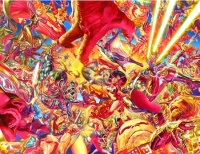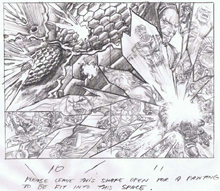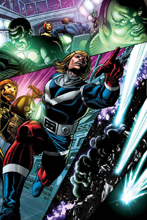 ICv2 got a chance to interview artist Alex Ross on his work with Kurt Busiek on Dynamite’s Kirby: Genesis, due out in May (see “Ross, Busiek Collaborating on 'Kirby: Genesis'”). In this interview, we talk with Ross about the raw material from Kirby, the artistic process, and working with Busiek and Jack Herbert.
ICv2 got a chance to interview artist Alex Ross on his work with Kurt Busiek on Dynamite’s Kirby: Genesis, due out in May (see “Ross, Busiek Collaborating on 'Kirby: Genesis'”). In this interview, we talk with Ross about the raw material from Kirby, the artistic process, and working with Busiek and Jack Herbert.Why did you decide to take on this project?
I knew that working with any of Kirby’s properties would be potentially intriguing. What opened up for me with the project is how much stuff we could expand into of his body of work. It’s so fantastic to elaborate on Kirby visuals that speak volumes but he never had or took the opportunity to do more with. Combining that with those independent works that he did elaborate on makes a fun new tapestry unique to Kirby’s vision given form as its own specific comic universe.
Can you explain your working process—how do you go about co-plotting an eight-issue series like this? Who does what?
A lot of what I contributed in this was recommending specific things that piqued my interest to elaborate on. Many of Kirby’s colored portfolio plates grabbed my attention as something to put more at the forefront of characters Kirby had completely visualized, and therefore we could more reasonably adapt his vision. Kurt did so much work in taking lead in this project that it was a real pleasure to hop on his creative wave. I’ve worked on a range of different projects where either I’ve taken lead or I’ve followed another’s, and this is very invigorating to know Kurt took this as a passion project to fully invest his time and curiosity in. Doing research into the archives of Kirby is a lot of work, and beginning to crack that sensibility for what Jack might have intended is a real challenge that takes a writer being at his most focused.
Do you provide page breakdowns for the penciler, and if so, which of you is more involved in doing so, or do you collaborate on that as well?
From Kurt’s script, I am following his visual cues to layout the pages as dramatically as I can see them. Jackson Herbert and I are very similar as artists, and there’s not a big divided between the way we may see things, so the challenge is to try and find some extra push in what I could contribute for layouts that would be more “in your face” as a way to interpret Kirby’s style of energy.
Alex, I understand that you are doing some painted interior pages as well cover designs. How do you decide which pages you will illustrate?
There are some characters in the story that will be painted every time they appear. This has necessitated some full pages as well as select panels to illustrate them in. Various other moments have included some introductory shots of key characters that I’ve illustrated. Kurt usually has some character or image in mind for where he’d like to apply me.
How do you integrate your painted art with the more traditional pencil, ink and color technique of Jack Herbert?
Since I’m laying out the pages that my painted works intersect with, and Jackson follows my guidelines, it’s been no trouble to have the two styles integrate.
Who is the favorite Kirby character you are working with on this project—and has that perception changed as you have gotten into it more?
Every character has an aspect of classic Kirby design work that I can lose myself in. There are a number of Hulk/Thing-sized characters, as well as semi-patriotic lead types. For one, I’m excited to do images of Silver Star to try and add my own approach of realistically rendering chrome to his metal finish. With this I’m hopefully making him an even more appealing Kirby archetype.
What are the elements of Jack Kirby’s art style that made him so influential? Have you tried to keep those elements in place in Kirby: Genesis?
When one describes Kirby’s style, a key word that is often used is “energy.” The kinetic energy of Kirby’s storytelling has an animated quality that propels the reader through the action. Kirby’s graphically simplified blocky body shapes breaks down figures and objects alike into a visual language that impacts on the subconscious level. It is in its way a form of cartooning, but also high art. Kirby drew the naked id of the mind. A lot of these shapes and ways of presenting the figure can be interpreted in a number of different styles, not exact Kirby. My approach may seem quite different, but I find that his world overlaps my sensibility very easily, and most of what I have to do is keep alive the specifics of his character designs and hopefully translate them with a decent understanding of how they work.
Click here for ICv2's interview with Kurt Busiek on Kirby: Genesis.




